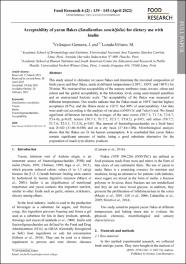Acceptability of yacon flakes (Smallanthus sonchifolia) for dietary use with inulin

Ver/
Descargar
(application/pdf: 471.3Kb)
(application/pdf: 471.3Kb)
Fecha
2022-04-28Autor(es)
Velásquez-Gamarra, J.
Lozada-Urbano, M.
Metadatos
Mostrar el registro completo del ítemResumen
“This study aimed to elaborate on yacon flakes and determine the proximal composition of
fresh yacon and final flakes, made at different temperatures (120°C, 150°C and 180°C) for
20 mins. We measured the acceptability of the sensory attributes: taste, texture, odour and
colour and the global acceptability at the laboratory level, using semi-trained panellists
and an unstructured hedonic scale. The acceptability of the flakes was measured at
different temperatures. Our results indicate that the flakes made at 180°C had the highest
acceptance (87%), and the flakes made at 120°C had 80% of unacceptability. Our data
were analysed according to the analysis of variance (ANOVA) and Tukey's test. We found
significant differences between the averages of the taste scores (T0:7.1; T1:7.6; T2:6.7;
T3:4.6), p<0.05; texture (T0:7.1; T1:7.2; T2:5.7; T3:4.5), p<0.05; and odour (T0:7.2;
T1:7.6; T2:5.1; T3:3.3), p<0.05. The amount of fructooligosaccharides on a fresh basis
was Ⱦ±SD (31.60±0.650) and on a dry basis (37.44±1DS). Microbiological analysis
shows that the flakes are fit for human consumption. It is concluded that yacon flakes
contain significant amounts of inulin, being a good substitute alternative for the
preparation of snack-type dietetic products“
Colecciones
- SCOPUS [380]

